- Home
- Francine Rivers
The Scribe Page 5
The Scribe Read online
Page 5
“You will never see me again until you say, ‘Blessings on the one who comes in the name of the Lord!’”
He left the Temple. Like sheep after the shepherd, His disciples followed. Some looked back in fear, others with excited pride. Voices rose in anger. The scribes and Pharisees, the priests, everyone seemed to be shouting at once. Would the anger inside this place overflow to the streets beyond? Faces twisted in rage. Mouths opened in curses upon the Nazarene. Some tore their clothing.
I fled.
I remember little of what I felt that day other than I had to get away from the wrath inside the Temple. Jesus walked away with His disciples. Part of me wanted to follow; the practical side of me held back. I told myself I had no choice. What Jesus asked of me would dishonor my father. I knew He had not asked the same of others. Why did He demand so much of me?
His words were like a two-edged sword, slicing through the lies I believed about myself. I was not the man of God I thought I was.
And then Jesus turned and looked at me. For the barest moment, I saw the invitation. Did I want to go back inside the Temple to my prayers and quiet contemplation, ignoring all that went on around me? Or did I want to follow a man who looked into me and saw the hidden secrets of my heart? One way required nothing; the other, everything.
I shook my head. He waited. I backed away. I saw the sorrow come into His eyes before He walked away.
I feel that sorrow now. I understand it more today than ever before.
The next time I saw Jesus, He hung on a cross between two thieves at Golgotha. A sign written in Hebrew, Latin, and Greek, hung above his head: “Jesus the Nazarene, the King of the Jews.”
I cannot explain what I felt when I saw Jesus outside the city gate, nailed on a Roman cross. Men I knew hurled insults at Him. Even in His hour of suffering and death, they had no pity. I felt anger, disappointment, relief, shame. I justified myself. It seemed I had not turned my back on God after all. I had rejected a false prophet. Hadn’t I?
What does that say of me? I thought myself a righteous young man striving always to please and serve God. Jesus exposed me as a fraud. The shame comes back to me now, years later. Such was my arrogance! Such was my willful blindness to the truth! I was equally ashamed of the religious leaders. Men I respected, even revered, stood below the cross, smirking, casting insults, mocking Jesus as He died. They felt no pity, showed no mercy. Not even the wailing of Jesus’ mother or the weeping women with her could rouse their compassion.
The rabbi I had followed for so long was among them. They reminded me of vultures tearing at a dying animal.
Would I become like them?
And where were Jesus’ disciples? Where were the men who had lived with Him for the past three years, who had left their homes and livelihoods to follow Him? Where were those who had stood along the road waving palm fronds and singing praises as Jesus entered Jerusalem? Had it been less than a week ago?
I remember thinking, Was it this poor carpenter’s fault that we expected so much of Him? When given the choice between an insurrectionist like Barabbas and a man who spoke of peace with God, the people clamored for the freedom of the one who killed Romans.
Nicodemus stood in the gate, tears streaming down his face, into his beard. Arms crossed, hands shoved deeply into his sleeves, he rocked back and forth, praying. I approached my father’s old friend, alarmed to see him in such distress. “May I help you?”
“Be thankful your father did not live to see this day, Silas. They would not listen! They set out to do what they would do. An illegal trial by night, false accusations, false witnesses; they’ve condemned an innocent man. God, forgive us.”
“You are an honest man, Nicodemus.” I thought to absolve him. “It is Rome who crucifies Jesus.”
“We all crucify Him, Silas.” Nicodemus looked up at Jesus. “The Scriptures are being fulfilled even as we stand here watching Jesus die.”
I left him to his grief. His words frightened me.
I celebrated Passover as the Law required, but felt no joy in reliving the deliverance of Israel from Egyptian bondage. Jesus’ words kept coming back to me. “God blesses those who are poor and realize their need for Him, for the Kingdom of Heaven is theirs.”
God had made death pass over His people in Israel. If Jesus was the Messiah, as I had once thought and Nicodemus still believed, what vengeance would God take against us? What hope had we of God’s intervention?
I dreamed of Jesus that night. I saw His eyes again, looking at me, waiting as He had that day when He left the Temple. When I awakened, the city was dark and silent. My heart beat heavily. I felt something in the air.
“I am the way and the truth and the life,” Jesus had said. The proclamation of God or words of a madman? I didn’t know anymore.
The way was lost, the truth silenced, the hope of the life Jesus offered as dead as He was.
It seemed the end of everything.
“You have been hard at work for a long time, Silas.” Epanetus stood in the doorway. “When we asked you to write your story, we did not intend you to become a slave to it.”
Silas put the reed into the pen case and blew on the last few letters he had written. “I’ve been lost in the past.”
“Has it been a comforting journey?”
“Not entirely.” He rolled the scroll carefully. His muscles were stiff, his back aching. As he rose, he stretched. “I was deaf and blind.”
“And Jesus gave you ears to hear and the eyes to see. Come, my friend. Walk with me in the garden.”
The warmth of the sun melted the tension in Silas’s shoulders. He filled his lungs with the sea air. Birds flitted about the garden, ta-ta-whirring from hidden perches. He felt safe here, as though a thousand miles from Rome, the arena, the maddened, screaming mob, but still not far enough away to escape from the memories of what happened there.
“Where are you in your story?”
“Jesus’ death.”
“I would give all I own to see His face, even for a moment.”
Silas winced inwardly, thinking of the years he’d wasted when he could have been with Jesus.
“What is it you remember most about Jesus?”
“His eyes. When He looked at me, I knew He saw everything.”
Epanetus waited for him to say more, but Silas had no intention of satisfying the Roman’s curiosity about what everything he meant.
“Do you long for Jerusalem, Silas?”
That was an easy enough question to answer. “Sometimes. Not the way it is now. The way it once was.” Was that even true? Did he long for the days before Christ came? No. He longed for the new Jerusalem, the one Jesus would bring at the end of the ages.
“Do you still have family there?”
“No blood relations, but there may be Christian brothers and sisters still there.” Perhaps a few remained firmly rooted, like hyssop in the stone walls of the city. He hoped so, for he prayed continually that his people would repent and embrace their Messiah. “I don’t know if anyone remains or not. I only hope. It’s been years since I stepped foot in Judea.” May the Lord always call someone to preach there, to keep the gate open for His people to enter into the fold.
“Perhaps you will go back.”
Silas smiled bleakly. “I would prefer God called me to the heavenly Jerusalem.”
“He will. Someday. We all pray that your time will not be soon.”
Some prayers Silas wished were left unsaid. “Had I remained in Rome, I might be there now.” Perhaps he should have stayed.
“God willed you here, Silas.”
“The scrolls are precious. They must be safeguarded.” He paused before a fountain, soothed by the sound of water. “I should be making copies of the scrolls, not writing about my trials.”
“We need the testimony of men like you, who walked with Jesus, who heard His teaching, who saw the miracles.”
“I didn’t. I told you. My faith came late.”
“But you were there.”<
br />
“In Judea. In Jerusalem. Once in Galilee. In the Temple.”
“Write what you remember.”
“I remember sorrow. I remember the joy of seeing Christ risen. I remember my shame and guilt being washed away. I remember receiving the Holy Spirit. I remember men who served Christ and died for it. So many I’ve lost count. My closest friends are with the Lord, and I feel . . .” He clenched and unclenched his hands.
“Envy?”
He let out a sharp breath. “You see too clearly, Epanetus.” Silas wished he could, for he felt lost in the mire of his own emotions. “I am so filled with feelings, and I fear none reflect the Spirit of God.”
“You are a man, not God.”
“A ready excuse I can’t accept. Peter hung upside down upon a cross, dying in agony, and still he prayed for those who nailed him there! He prayed for every person in that arena. He prayed the same words our Lord did: ‘Father, forgive them.’ Forgive the whole wretched mass of mankind. And what did I pray? For judgment! For their annihilation! I would have rejoiced to see every Roman burned by God’s fire, and Rome itself made ash!”
He felt Epanetus’s silence and thought he understood it. “Do you still want me under your roof?”
“Roman blood runs in my veins. Do you pray now that God will judge me?”
Silas shut his eyes. “I don’t know.”
“An honest answer, and I won’t put you out for it. Silas, I knew the same kind of bitterness when several of my friends were murdered by zealots in Jerusalem. I hated every Jew in sight and took vengeance whenever allowed. I don’t know how many of your people I killed or arrested. And then I met a boy. About Curiatus’s age. And he had more wisdom than any man I’d ever known.” He laughed softly. “He said he knew the God of all creation, and that same God wanted to know me, too. It was the first time I had heard of Jesus. The miracle was I listened.”
“You were wiser than I.”
“You came to faith eventually. That is what matters.”
“When were you in Judea?”
His eyes flickered. “Years ago. What a country! Intrigue and savagery are not limited to Rome, my friend. Men are the same everywhere.”
“Some men never change. After all these years, I find my faith as frail as it was in the first weeks after Jesus ascended.”
“You suffer because you love Him, Silas. You love His people. Love brings suffering. God will help you find your way.”
Macombo came out to them. “The brothers and sisters are beginning to arrive.”
Silas joined them in prayer and singing praises to Jesus. He closed his eyes and covered his face as Patrobas read Peter’s letter. No one asked him to say anything. Even Curiatus remained silent, though he sat close to Silas. Diana was there also. Silas thought of Peter and his wife. They had teased each other with the familiarity of long years together rich in love.
Diana smiled at him, and his heart quickened.
He had felt euphoria before. And every time it had had to do with Jesus.
He looked at Epanetus talking with Macombo, Urbanus laughing with Patrobas. These people reminded him piercingly of those who had met in the upper room in Jerusalem so many years ago—men, women, slave, free, rich, poor. Jesus brought them all together and made them one family. One in Christ, one body, one Spirit.
The darkness he had felt pressing in around him rolled back a little and gave him a glimpse of the confidence he had lost. Not confidence in himself, but in the One who saved him.
I laugh now as I think of it. How can I express the joy I felt on the day I saw Jesus alive again? He looked at me with love, not condemnation! A friend of mine knew where the disciples had hidden, and we went to tell them the good news. We were both shaking with exhaustion and excitement by the time we knocked on the door of the upper room.
We heard voices inside, frightened, arguing. Peter, firmly commanding, “Let them in.”
My friend whispered loudly, “Let us in!”
“Who is with you?”
“Silas! A friend of mine. We have news of Jesus!”
Peter opened the door. I could see he did not remember me, and I was glad of it. My friend blurted out, “Jesus lives!”
“He was just here.”
My heart raced as we entered. I looked around the room. I wanted Jesus to know I’d changed my mind. I would do whatever He asked of me now. “Where is He?”
“We don’t know. He was here for a while, and then He was gone.”
“We were all sitting here and suddenly, there He was.”
“It was no ghost,” I said. “It was Jesus. We must go to the Temple.”
Matthew laughed. “So we can be arrested?”
“I’ll go.” I was brave in that brief moment.
Peter put his hand on my arm. “Caiaphas and the others will silence you.”
“Stay with us,” John said.
“We’ll leave soon. Come with us to Galilee.”
For months, I had wished to be a part of this group of chosen men, but I could not in good conscience leave Jerusalem. “I can’t!” How could I go knowing that Jesus was alive? “Others must hear the good news. I must tell Nicodemus.”
I knew where to find my father’s old friend. Nicodemus saw me coming, and met me in the portico. A finger to his lips, he drew me aside. “I can see by your face the news you bring. Rumors abound.”
“It’s no rumor, Nicodemus.”
“Jesus’ body is missing. That does not mean He’s come back to life.”
I leaned close. “I’ve seen Him with my own eyes, Nicodemus. He’s alive!”
His eyes glowed, but he looked around cautiously. “Unless Jesus walks into the Temple and declares Himself, nothing will change.”
“How can you say that? Nothing will ever be the same again.”
His fingers dug into my arm as he guided me to the Temple steps. He spoke low, head down. “Caiaphas and several others met with the Roman guards left in charge of the tomb. They have paid them a large bribe to say Jesus’ disciples came during the night while they were sleeping, and stole His body.”
“The moment Pontius Pilate hears of this, they will be executed for negligence of duty.”
“Lower your voice, my son. The priests will stand up for the guards who have agreed to be part of this plan. Go back to Jesus’ disciples. Tell them what Caiaphas and the others have done. They intend to spread this rumor quickly and as far as possible in order to discredit any claims that Jesus lives. Go! Hurry! They must convince Jesus to come to the Temple and declare Himself.”
I told Peter what Nicodemus had said, but he shook his head. “None of you must make the same mistake I did. I tried to tell Jesus what to do once. He called me Satan and told me to get away from Him.”
“But surely it would make all things clear to Caiaphas and members of the high council if He did go to the Temple.”
Simon the Zealot stood. “I heard Jesus say that even if a man returned from the dead, those men would not believe. If Jesus stood before them and showed them His nail-scarred hands and feet, they would still deny He is the Christ, the Son of the living God!”
Seven of Jesus’ disciples left for Galilee.
Peter told me later that Jesus had built a fire, cooked fish, and met with the seven disciples on the shores of the Sea of Galilee. He appeared to a crowd of five hundred—I among them—and then to His brother James. For forty days, Jesus walked the earth and spoke with us. I have not the words to tell you the many things I saw Him do, the words He said. He blessed us, and then He returned to the home from which He came: heaven.
I saw the Lord taken up in a cloud. The disciples and all the rest of us would still be on that mount had not two angels appeared. “Someday He will return from heaven in the same way you saw Him go!”
Oh, how I long for that day to come.
All of them are gone now, those friends I held so dear. Of the 120 who met in the upper room to praise God and pray, the 120 who first received the Holy Spirit wh
o lit our faith on fire, and sent us out to proclaim Him, only two remain: John, the last of the Twelve, whose faith flashes like a beacon from Patmos, and me, the most unworthy.
Every day, I look up and hope I’ll see Jesus coming through the clouds.
Every day, I pray someday will be today.
* * *
THREE
* * *
After Jesus ascended to His Father, those of us who followed Jesus remained in Jerusalem. The Twelve—except for Judas the betrayer, who killed himself—stayed in the upper room, along with others who had come from the district of Galilee, including my friend Cleopas. Mary, Jesus’ mother, and His brothers, James, Joseph, Jude, and Simon were there, along with the Lord’s sisters and their families, and Mary’s sister as well. Nicodemus and Joseph of Arimathea came and went. We prayed for them constantly, for Caiaphas had learned they had taken down Jesus’ body, anointed it, and placed it in Joseph’s tomb, and he now threatened them with expulsion from the Temple. Mary Magdalene, Joanna, Mary the mother of James the younger, and Salome were also there with us, along with Matthias and Barsabbas, who had followed Jesus from the day John baptized Him in the Jordan River. The Lord chose Matthias to replace Judas as one of the Twelve.
Fifty days after Jesus had been crucified, forty-seven after He arose, seven days after He ascended to His Father in heaven, on the day of Pentecost, when Jews from all over the empire gathered in Jerusalem, there came upon that house a violent, rushing wind such as I had never heard before or since. It filled the place, and then tongues of fire appeared on each of us. The Holy Spirit filled me, and I felt compelled along with the others to run outside. The fear of men that had haunted us was gone! We rushed headlong into the crowd, crying out the Good News!
A miracle took place inside us. We spoke languages we had not known. Peter spoke before the crowd with eloquence and a knowledge of Scripture that astounded the scribes. Where did a common fisherman come by such wisdom? We know it came from Jesus, poured into him through the Holy Spirit!
I had a gift for languages, but on that day, I spoke to Parthians, Medes, Elamites, and Mesopotamians, all in languages unknown to me until then. That day of miracles, Christ spoke to all men through us. The Lord declared Himself to men and women from Cappadocia, Pontus, Asia, and Phyrgia. The Good News was preached to families from Pamphylia, Egypt, Cyrene, and as far away as Libya and Rome itself! Even Cretans and Arabs heard Jesus was the Savior, Lord of all!

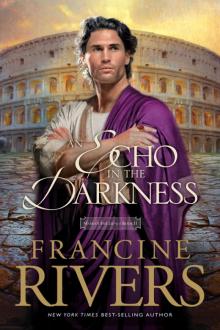 An Echo in the Darkness
An Echo in the Darkness A Lineage of Grace
A Lineage of Grace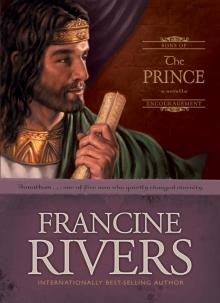 The Prince: Jonathan
The Prince: Jonathan Bridge to Haven
Bridge to Haven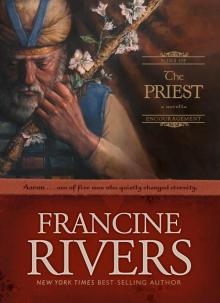 The Priest: Aaron
The Priest: Aaron Her Mother's Hope
Her Mother's Hope Redeeming Love
Redeeming Love The Scarlet Thread
The Scarlet Thread The Masterpiece
The Masterpiece The Last Sin Eater
The Last Sin Eater The Prophet: Amos
The Prophet: Amos As Sure as the Dawn
As Sure as the Dawn Her Daughter's Dream
Her Daughter's Dream A Voice in the Wind
A Voice in the Wind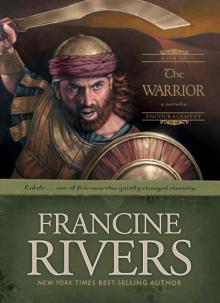 The Warrior: Caleb
The Warrior: Caleb The Scribe: Silas
The Scribe: Silas And the Shofar Blew
And the Shofar Blew The Atonement Child
The Atonement Child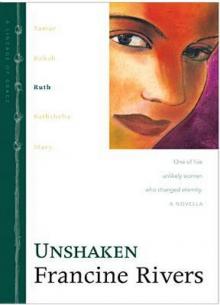 Unshaken_Ruth
Unshaken_Ruth Unspoken_Bathsheba
Unspoken_Bathsheba The Scribe
The Scribe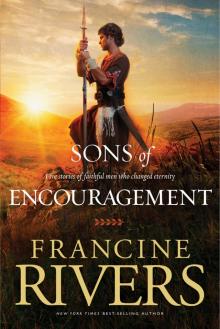 Sons of Encouragement
Sons of Encouragement The Shoe Box
The Shoe Box Sycamore Hill
Sycamore Hill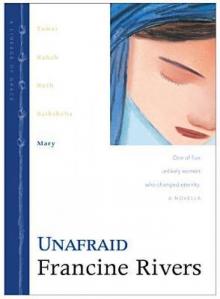 Unafraid_Mary
Unafraid_Mary Marta's Legacy Collection
Marta's Legacy Collection